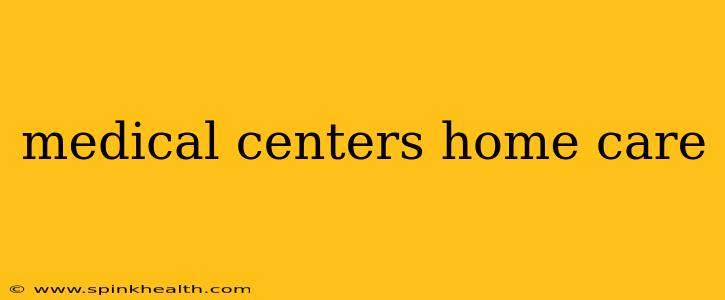The familiar sterile scent of a hospital, the constant beeping of machines, the hushed whispers of nurses – for many, these are unwelcome memories associated with illness. But what if recovery could happen in the comfort of your own home? That's where medical center home care steps in, offering a lifeline of expert medical assistance in the familiar surroundings you cherish most. This isn't just about convenience; it's about a holistic approach to healing, focusing on both physical and emotional well-being.
Let's embark on a journey to understand this vital service and dispel any misconceptions you might have.
What is Medical Center Home Care?
Medical center home care, sometimes referred to as home healthcare services provided by a medical center or hospital system, goes far beyond basic in-home assistance. It's a comprehensive approach to healthcare delivered by trained professionals directly to your residence. This might include registered nurses, licensed practical nurses (LPNs), certified nursing assistants (CNAs), physical therapists, occupational therapists, speech therapists, and medical social workers. The services are tailored to individual needs, dictated by a physician’s orders, and often coordinated through a hospital or medical center's dedicated home care department.
Imagine this: you've undergone a significant surgery or are managing a chronic illness. Instead of facing a lengthy hospital stay, a skilled nurse visits your home, administers medication, monitors vital signs, and assists with wound care. A physical therapist works with you on regaining mobility, while a social worker helps navigate the emotional and logistical challenges of recovery. This individualized attention allows for a faster, more comfortable, and often less expensive recovery.
What Types of Conditions Benefit from Medical Center Home Care?
Many conditions can benefit from the personalized attention of medical center home care. It's not just for post-surgical patients; it's a valuable resource for individuals managing:
- Chronic illnesses: Diabetes, heart failure, COPD, and other chronic conditions often require ongoing monitoring and management. Home care allows for regular check-ups and medication adjustments in the comfort of home.
- Post-surgical recovery: Home care provides skilled nursing care, wound care, and pain management, speeding up the recovery process and reducing the risk of complications.
- End-of-life care (hospice): For patients facing a terminal illness, home care can provide compassionate care and support to both the patient and their family, focusing on comfort and quality of life.
- Rehabilitation: Physical, occupational, and speech therapy can be administered at home, facilitating faster recovery and improved mobility, reducing the need for institutionalized rehabilitation.
How is Medical Center Home Care Different from Other Home Care Services?
The key differentiator is the direct link to a medical center. This often translates to:
- Seamless transitions: Discharge planning from the hospital is smoother, with care coordinated between the hospital team and the home care team.
- Access to specialized expertise: Hospitals often have access to a wider range of specialists and advanced technologies, making it easier to address complex medical needs at home.
- Higher level of care: The services often include more skilled nursing and specialized therapies compared to basic home health aide services.
- Enhanced quality assurance: Hospitals typically have rigorous quality assurance programs, ensuring a higher standard of care.
How Do I Access Medical Center Home Care Services?
Accessing medical center home care usually involves a referral from your physician or hospital discharge planner. They will assess your needs and determine the appropriate level of care. Insurance coverage varies, so it's crucial to check with your provider about your benefits and coverage limits. Many hospitals have dedicated home care departments that can guide you through the process.
What are the Costs Involved in Medical Center Home Care?
The cost of medical center home care is highly variable, depending on the type and frequency of services, the duration of care, and your insurance coverage. It's essential to inquire about the costs upfront and explore your insurance options to understand your financial responsibilities.
What are the Benefits of Medical Center Home Care?
The benefits extend beyond the convenience of home-based care. They encompass:
- Faster recovery: Reduced hospital stays, leading to quicker return to normalcy.
- Improved quality of life: Maintaining comfort, independence, and dignity in a familiar setting.
- Reduced risk of hospital-acquired infections: Avoiding potential infections associated with hospital environments.
- Cost savings: In many instances, home care can be more cost-effective than extended hospital stays.
- Family support: Easing the burden on family members by providing professional care and support.
Medical center home care is more than just healthcare; it's about empowering individuals to heal and thrive in the comfort and security of their homes. It's a testament to the evolving landscape of healthcare, prioritizing personalized care and patient-centered outcomes.

